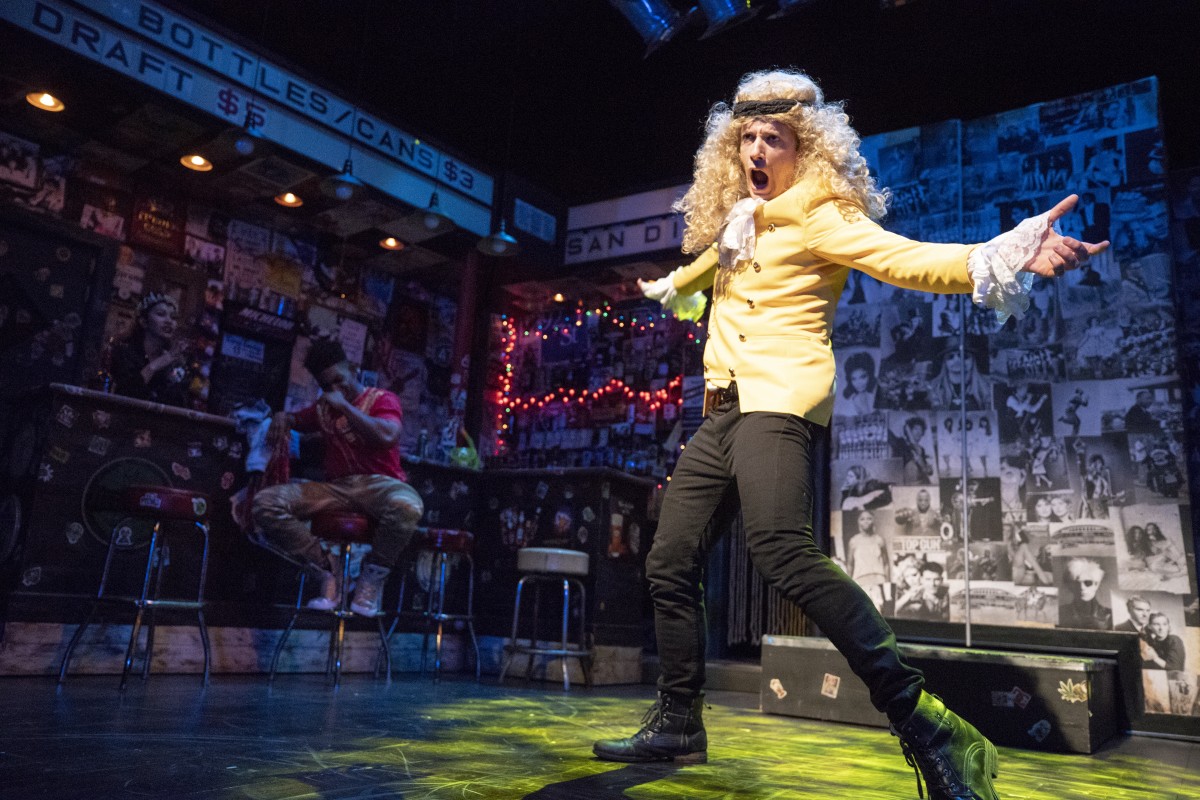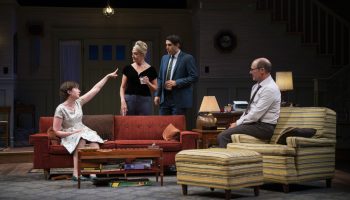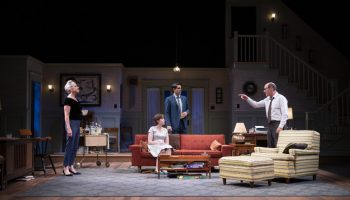
While Chautauqua Theater Company technically does not have a musical as part of its 2018 season, Airness supplies theatergoers with songs in spades.
For the show’s many musical performances, sound designer Miles Polaski crafted 60-second cuts of songs from popular bands like Heart and Queen. CTC sound design fellow Jeff Sherwood, who assisted Polaski, said the show’s energy upgraded when rehearsals moved from Brawdy Studios to Bratton Theater.
“The show features a lot of classic rock songs, all the songs that you find on ‘Guitar Hero,’ ” Sherwood said. “In the rehearsal space, we just had a small speaker, and trying to get a rock concert feel out of a tiny little speaker in the rehearsal room is just not physically possible.”
Although the characters on stage only lip sync the lyrics and mime the chords, audience members are encouraged to sing and clap along to the music. The workshop production of Airness continues its run with performances at 2:15 and 8 p.m. Wednesday, July 25, in Bratton.
The play follows a group of competitive air guitarists as they travel across the country to play imaginary instruments in the hopes of achieving “airness,” the state of transcending imitation to make air guitar an art form of its own.
To do this, the performers each select a 60-second cut of a song they believe best represents their attitude and abilities. This song can sometimes change backstage hours before their performance.
“You’ll find out there’s a lot of deep very philosophical conversation about why a performer might not be playing the right song for him, and if he’s not, then what is that song?” Polaski said.
Polaski said that the show does not begin at full blast, but rather builds in intensity.
“There’s a little bit of an arc to the play sonically,” he said.
“At first, we don’t necessarily want to go full concert mode. For the first few performances, we want to make it feel a little more (like a) hometown bar or rundown bar. As the play progresses, the sound starts to morph.”
-Miles Polaski, Sound designer, Chautauqua Theater Company
The conservatory actors in the cast learned how to play air guitar from Matt “Airistotle” Burns, two-time world champion of air guitar. Polaski said Burns also taught him how to make a good cut for an air guitar solo.
“They have a beginning, a middle and an end, kind of an arc to them, or more of a crescendo,” Polaski said. “I think Matt gave me some of the best feedback that every air guitar performance should end with a big button. It should not fade out.”
Polaski said that air guitar solos are similar to monologues in that they have to quickly and clearly tell a good story. He experimented with different cuts throughout the rehearsal process to find what would work best for the play’s narrative, finding one song in the second act to be a particular challenge.
“There is a song in this production that is used as an insult, which in air guitar world (is a) no-no,” Polaski said. “It’s got to have just enough guitar, the lyrics have to be spot-on and also the character that selects the song as an insult, it’s coming from them, so the voice of the musicians needs to identity with the voice of the character.”
Burns said air guitar can tell stories because it pays homage to an inherently expressive instrument.
“It’s the only one you can literally carry around with you on stage, and a solo can tell an entire story,” he said. “The fact that that specific instrument is that expressive makes it really easy and natural for you to move your body to. I like to call air guitar ‘interpretative dance to a better soundtrack,’ and I think that that’s only possible because of how beautiful the guitar is.”
In 2016, Airness premiered at the Humana Festival in Louisville, Kentucky. Since then, playwright Chelsea Marcantel said she and Polaski, her husband, have adjusted the play’s soundtrack to better convey the story and avoid potential legal issues.
“The first go-around, when I wrote the first draft of the play, the songs were all songs that I really love,” Marcantel said. “Now we’re dealing with, ‘Can we get the rights to these things we’ve picked?’ ”
At one point, Marcantel was worried she was out of touch with contemporary music because all her selections were from the ’70s and ’80s. She said she later realized why her play’s soundtrack relied so much on classic rock.
“No one uses guitar in pop music anymore,” Marcantel said. “Guitar sales have apparently plummeted in the last 10 years. Everybody just makes music on their laptop. Forget pausing for 50 seconds in the middle of a song for Slash to come out and play a solo. That never happens.”
Marcantel said she hopes audiences will see Airness and feel nostalgic for its music.
“I think this is a good reminder of what (guitar) sounds like,” Marcantel said. “Isn’t this fun? Let’s bring this back.”





